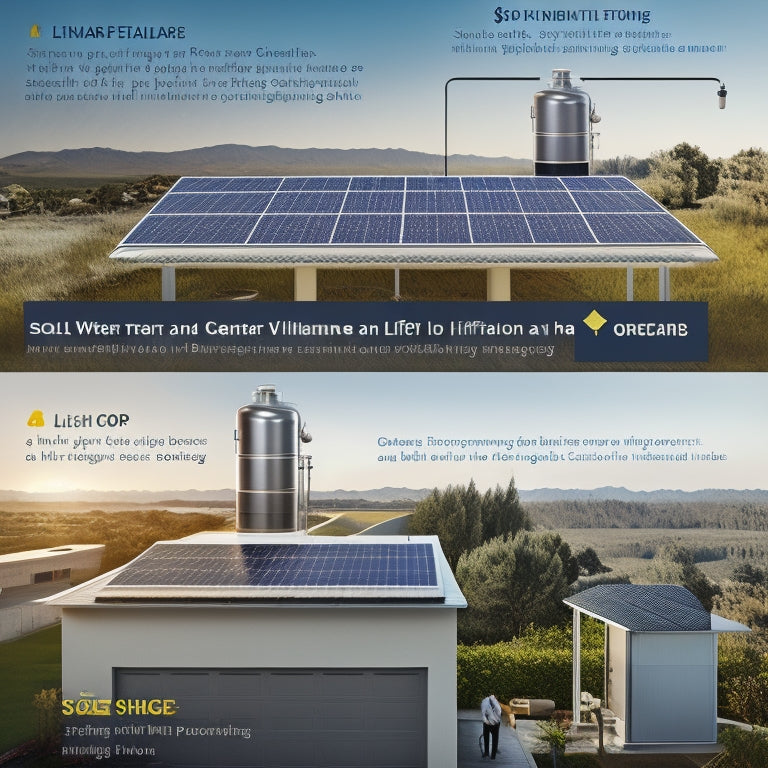
What's the ROI Timeline for Solar Water Heaters?
Share
You can expect to break even on your solar water heater investment in 5-10 years, with well-maintained systems typically lasting over 20 years and providing ongoing savings. Factors like system costs, climate, local incentives, installation quality, and maintenance expenses influence the payback duration. With an average ROI period of 5-10 years, you'll start seeing significant energy savings, potentially up to $400 annually. To maximize your ROI, it's crucial to evaluate system components, energy efficiency, and local incentives. As you investigate further, you'll uncover more ways to optimize your investment and reap the long-term benefits of solar water heating.
Key Takeaways
- The average ROI timeline for solar water heaters is 5-10 years, with well-maintained systems providing ongoing savings over 20 years.
- ROI is influenced by system costs, climate, local incentives, installation costs, and maintenance expenses, which can shorten or lengthen the payback period.
- Federal tax credits, state rebate programs, and net metering laws can significantly reduce upfront costs and enhance ROI, with some incentives expiring by December 31, 2023.
- Energy efficiency, quality system components, and proper installation are crucial for optimal system performance and longevity, directly impacting ROI.
- Ongoing maintenance, energy efficiency practices, and staying informed about technological advancements can maximize ROI potential and support sustainability efforts.
Understanding Solar Water Heater Costs
As you investigate the world of solar water heaters, pinning down the costs becomes an essential step in determining the feasibility of this eco-friendly investment. The initial installation costs, which can range from $3,000 to $10,000, are a significant factor.
However, you'll need to evaluate the long-term savings as well. Shifting to renewables, such as solar-powered fast charging, can enhance energy security and resilience.
Maintenance expenses, typically around $100 to $300 per year, are relatively low compared to traditional water heaters. Additionally, solar water heaters can last up to 20 years, reducing the need for frequent replacements.
Federal and State Incentives Explained
You'll be eligible for federal tax credits, which can greatly reduce your solar water heater's upfront cost.
In addition, you may be able to take advantage of state rebate programs, which vary by location but can provide additional financial incentives.
Moreover, you'll want to familiarize yourself with net metering laws, which govern how you can sell excess energy back to the grid and offset your utility bills.
Many states and localities offer unique incentives such as tax credits and rebates for sustainable infrastructure Federal Incentives, and community outreach can simplify guidance through available state and local incentives.
Federal Tax Credits
The federal government offers a considerable incentive for installing solar water heaters: a tax credit equal to 26% of the total cost of the system. This federal tax credit directly reduces your tax liability, providing substantial investment benefits.
Similar to Federal EV Tax Credits, which offer up to $7,500 per vehicle for commercial fleets, this credit can considerably reduce the upfront cost of your solar water heater, making it a more attractive investment. You can claim this credit on your tax return, and it's available for both residential and commercial properties.
To qualify, your solar water heater must meet certain energy efficiency criteria and be installed before December 31, 2023. By taking advantage of this incentive, you can considerably reduce the upfront cost of your solar water heater, making it a more attractive investment.
This credit can be combined with other incentives, allowing you to maximize your savings and accelerate your return on investment.
State Rebate Programs
By December 2023, when the federal tax credit expires, state rebate programs will become an important component of the ROI timeline for solar water heaters. As you investigate these incentives, you'll find that state funding varies widely. Some states offer generous rebates, while others provide minimal support. To maximize your savings, it's vital to understand the rebate eligibility criteria and amounts in your state.
| State | Rebate Amount |
|---|---|
| California | Up to $1,500 |
| New York | Up to $1,000 |
| Florida | Up to $500 |
Remember to research your state's specific programs and eligibility requirements to guarantee you're taking advantage of all available incentives. By doing so, you'll be able to optimize your ROI timeline and enjoy the freedom that comes with utilizing renewable energy.
Net Metering Laws
Solar panels feeding into the grid illustrate the significance of net metering laws in the ROI timeline for solar water heaters. As you consider investing in a solar water heater, understanding these laws is essential.
Net metering benefits allow you to generate your own electricity and export any excess to the grid, offsetting your energy consumption. However, net metering challenges, such as varying state policies, can affect your ROI. In addition, utilizing renewable energy can lead to potential tax credits, grants, and the opportunity to trade carbon credits renewable energy incentives, increasing revenue opportunities.
Moreover, solar-powered systems can offset up to 3,000 pounds of CO2 emissions annually, contributing to a cleaner environment.
- Federal laws require utilities to offer net metering to customers with systems up to 1 megawatt
- States have varying policies, with some offering more favorable terms than others
- Net metering can increase the value of your property, but may also increase your property taxes
- You can sell excess energy back to the grid, but rates vary by state and utility
- Some states have specific requirements for metering and monitoring systems
Calculating Your Energy Savings
Frequently, homeowners who install solar water heaters wonder how much they'll actually save on their energy bills.
To calculate your energy savings, you'll need to evaluate your current energy consumption and the energy efficiency of your new solar water heater. By reducing your reliance on traditional energy sources, you can considerably lower your energy bills.
Additionally, solar water heaters require minimal maintenance costs, which can further increase your savings. For instance, regular cleaning of solar panels enhances energy efficiency, ensuring ideal performance.
Similarly, a hybrid approach to energy usage can also maximize energy usage and reduce overall energy costs. By crunching the numbers, you'll be able to determine exactly how much you'll save each month.
With an average energy efficiency of 80-90%, solar water heaters can save you up to $400 per year on your energy bills.
Average ROI Timeline Expectations
Typically, homeowners who invest in solar water heaters can expect a relatively swift return on investment (ROI). You can recoup your investment within 5-10 years, depending on your energy usage and local incentives.
A well-maintained solar water heater can last up to 20 years or more, providing you with significant energy savings over its lifetime.
To guarantee a smooth installation process and peak performance, keep the following tips in mind:
- Follow the manufacturer's maintenance tips to extend the system's lifespan
- Regularly inspect the system for signs of wear and tear
- Keep the solar panels clean to maximize energy absorption
- Consider upgrading to a more efficient system if your energy needs change
- Monitor your energy usage to identify opportunities for further savings
Factors Affecting Payback Period
You'll find that several factors impact the payback period of your solar water heater investment.
Specifically, system costs, climate and location, and local incentives will influence how quickly you recoup your costs.
System Costs
Several factors contribute to the overall system costs of a solar water heater, which in turn affect the payback period. As you consider investing in a solar water heater, it's crucial to comprehend these cost components.
-
Installation costs: This includes the price of the system, labor, and any necessary permits or inspections.
-
Maintenance expenses: Regular maintenance is necessary to guarantee peak system performance, and these costs can add up over time.
-
Equipment upgrades: You may need to replace or upgrade system components, such as pumps or valves, during the system's lifetime.
-
Energy efficiency: The system's efficiency can impact your energy savings, and consequently, your payback period.
-
Incentives and rebates: Federal, state, or local incentives can reduce your upfront costs and accelerate your payback period.
Climate and Location
Your solar water heater's performance is deeply tied to the climate and location where it's installed. The amount of solar exposure your system receives directly impacts its ability to heat water efficiently.
In regions with high solar exposure, like the southwestern United States, your solar water heater will perform better and pay back faster. Conversely, locations with limited sunlight, such as the Pacific Northwest, will see slower returns.
The regional climate also plays a significant role, as systems in areas with mild winters and cool summers will perform more consistently than those in regions with extreme temperature fluctuations.
Local Incentives
Installed in conjunction with favorable local incentives, solar water heaters can greatly shorten their payback period.
You can considerably reduce the time it takes to recoup your investment by taking advantage of local programs and community partnerships.
These incentives can come in various forms, including:
- Rebates or tax credits offered by local governments or utilities
- Low-interest loans or financing options for solar water heater installations
- Property tax exemptions or assessments that reduce your tax liability
- Special permits or zoning variances that simplify the installation process
- Community-led initiatives that provide discounts or promotions for solar water heater adopters
Comparing Solar to Traditional Heaters
When evaluating solar water heaters, it's essential to compare their performance to traditional heaters, as this contrast will help you understand the benefits and drawbacks of each option.
Efficiency comparisons show that solar water heaters have higher energy efficiency rates, typically above 80%, compared to traditional heaters, which range from 40% to 60%.
Technology advancements have improved solar water heater designs, allowing them to utilize more energy from the sun. This results in reduced energy consumption and lower utility bills.
You'll also benefit from a longer lifespan, with solar water heaters lasting up to 20 years or more, compared to traditional heaters' 10-15 year lifespan.
Real-World Solar Water Heater Examples
Across the globe, numerous households and businesses have successfully integrated solar water heaters into their daily operations, reaping the benefits of reduced energy costs and a lower carbon footprint.
You'll find a wealth of useful knowledge from real-world examples, showcasing the technology's effectiveness.
-
Installation experiences highlight the importance of proper system sizing and placement for peak performance.
-
Maintenance challenges are often minimal, with users citing infrequent cleaning and occasional replacement of valves and pumps.
-
User testimonials praise the reliability and efficiency of solar water heaters, with many reporting significant energy cost savings.
-
Efficiency comparisons demonstrate that solar water heaters outperform traditional heaters, especially in regions with high solar irradiance.
-
Product reviews and market trends indicate a growing demand for advanced solar water heater systems with improved technology and cost-effectiveness.
Maximizing Your ROI Potential
With a solar water heater, you can reveal significant savings on your energy bills, but to maximize your return on investment (ROI), it's crucial to optimize your system's performance.
This involves ensuring energy efficiency through regular system maintenance, high-quality installation, and staying up-to-date with technology advancements. A seamless user experience and smart integration can also enhance long-term benefits.
By doing so, you'll not only enjoy cost savings but also contribute to a reduced environmental impact. Staying informed about market trends and advancements can help you make the most of your investment.
Frequently Asked Questions
Can I Install a Solar Water Heater Myself to Save Money?
Think you're a DIY expert? Think again! You'll face installation challenges and cost considerations that might negate the savings. Unless you're a plumber and electrician rolled into one, hiring a pro is likely your best bet for a smooth, cost-effective solar water heater setup.
How Do I Maintain My Solar Water Heater to Ensure Longevity?
You'll maximize system efficiency by performing routine inspections, checking temperature sensors, and verifying proper water flow; this proactive approach will help you avoid costly repairs, guarantee peak performance, and enjoy your solar water heater's full lifespan.
Are Solar Water Heaters Suitable for Colder Climates or Seasonal Use?
You'll find solar water heaters can still work in colder climates, but efficiency ratings drop considerably in winter; look for units with high winter performance ratings, and consider supplemental heating sources to guarantee consistent hot water.
Can I Use a Solar Water Heater With My Existing Plumbing System?
Like a puzzle piece, your existing plumbing system can fit with a solar water heater, but you'll need to assess system compatibility and consider plumbing modifications, ensuring a seamless integration that frees you from traditional energy constraints.
Are There Any Specific Certifications or Warranties to Look For?
When shopping for a solar water heater, you'll want to look for certifications from organizations like SRCC (Solar Rating and Certification Corporation) and IAPMO (International Association of Plumbing and Mechanical Officials), ensuring compliance with strict certification standards, and warranty coverage that guarantees performance and durability.
Related Posts
-

7 Best Cool Roof Rebates for Energy-Savvy Homeowners
You're an energy-savvy homeowner looking to install a cool roof, and you're wondering which rebates can help you save...
-

7 Best Geothermal Cooling Systems for Hot Climate Homes
You're evaluating geothermal cooling systems for your hot climate home, and you want to know the top options. Look fo...
-

What Water-Saving Gardens Complement Electric Vehicle Ownership?
As you pair your electric vehicle with a water-saving garden, you're not only reducing your carbon footprint but also...


